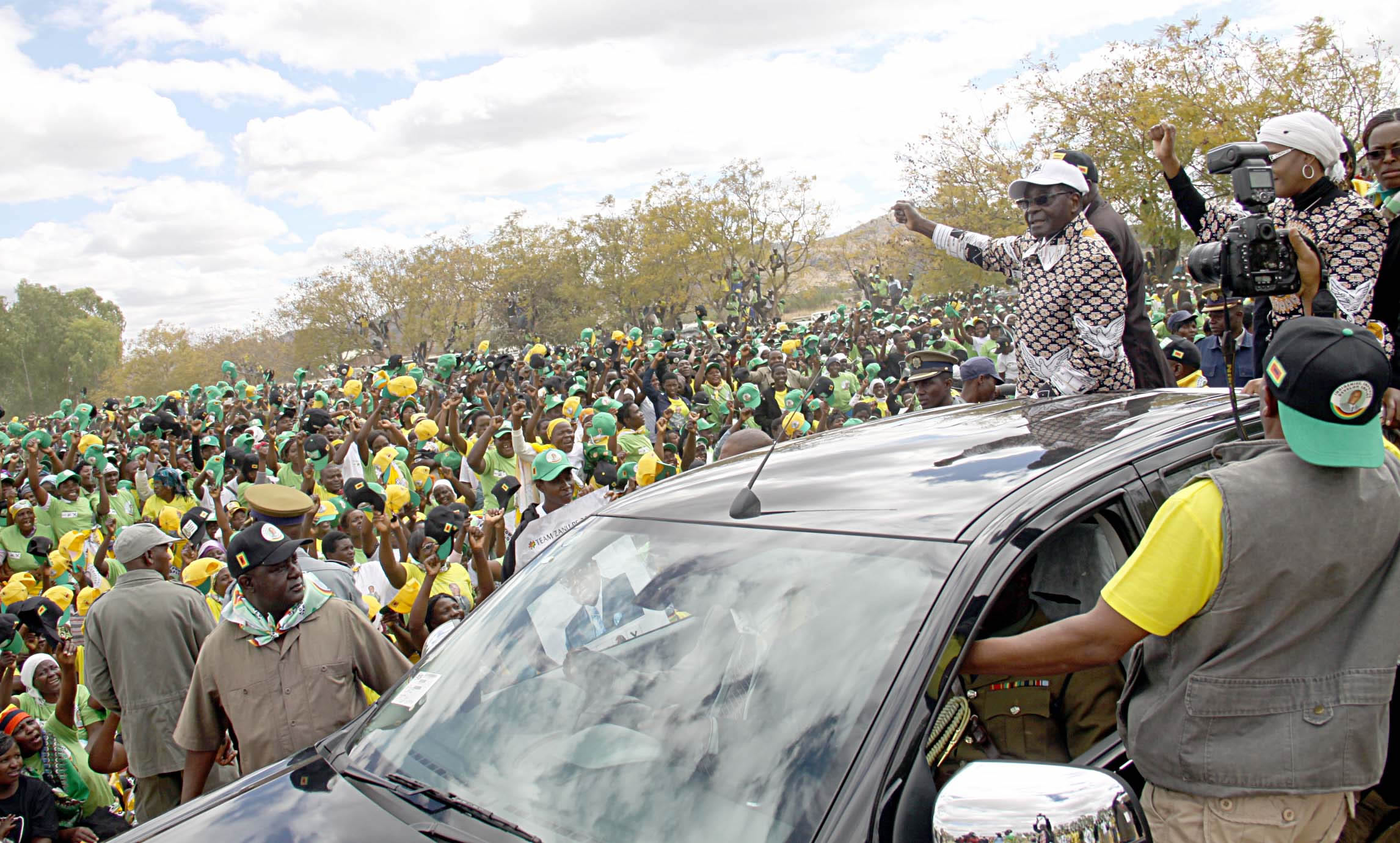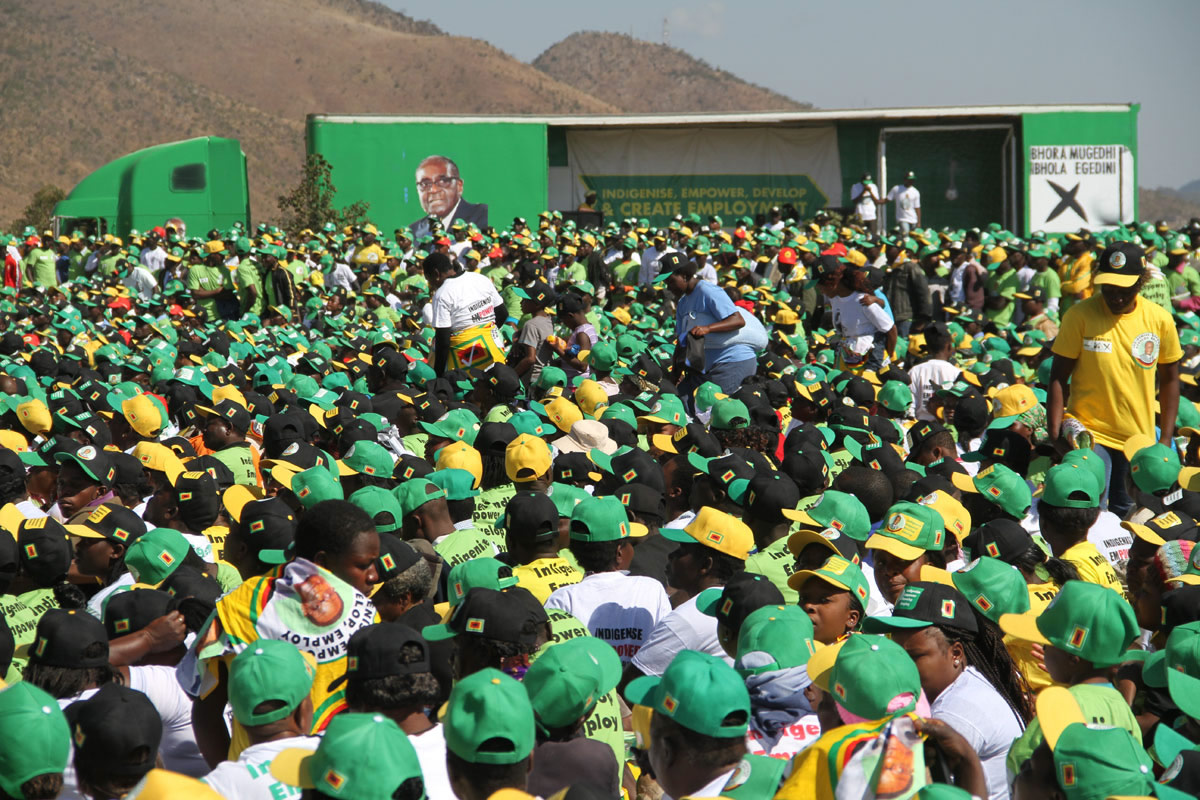No propaganda must detract Zanu-PF from celebrating victory

Kennedy Mavhumashava
PROPELLED by an illustrious history, a massive grassroots appeal, a convincing message and outstanding mass mobilisation capacity, the party has become an efficient political machine. Indeed, with so much experience and policies that resonate with the people, Zanu-PF cannot lose an election to anyone, but only to itself like it did in 2008 when it went into that election divided.
This time, the party fought as Team Zanu-PF 2013, eschewing the self-defeating bhora musango campaign of 2008. While there is always that apprehension when one goes into an election, Zanu-PF always had a sense that 31 July was the day to stage a comeback.
Its main challenger, MDC-T, was ill-prepared, deeply divided, had no message to convince anyone, is led by a flawed leader who addressed small rallies. A crisis party that has thrived on a poor economy, MDC-T has failed to survive in a stable economy as its dismal performance last Wednesday shows.
President Mugabe secured 61 percent of the vote after 2 110 434 of the 3 480 347 people who voted in this election gave him their support. The revolutionary party also won 160 National Assembly seats. MDC-T got a deserved 49; its president, Mr Morgan Tsvangirai polling 1 172 349 or 33, 9 percent of the valid vote.
But since Thursday last week, propaganda by the West and MDC-T questioning the legitimacy of the election result has intensified. The first reports questioning the election came as early returns showed Zanu-PF on a rebound.
Ironically, just a day earlier, MDC-T leader, Mr Morgan Tsvangirai was bullish about his chances. He predicted a “resounding” win for himself and his party.
“This is a very historic moment for all of us,” he told journalists after casting his losing vote in Mt Pleasant, Harare.
“I wish everyone the time to complete the change. It is quite an emotional moment, sometimes when you see all these people after all the conflict, the stalemate, the suspicion, the hostility. I think there is a sense of calmness that finally Zimbabwe will be able to move on again.”
On the eve of the election, his treasurer-general, Mr Roy Bennett was quoted by a South African paper equally confident.
“The strength [of MDC-T] in the rural areas is now even stronger than what used to be the MDC base, which was the city. Rural areas are far stronger. This time, the energy and the vibrancy is 10 times more than what it was in 2008,” he said.
Within 24 hours, a downcast Mr Tsvangirai was issuing a statement citing a litany of factors he said impaired the validity of the election and its result. Zanu-PF had “stolen” the election, he alleged. Mr Bennett, in self-imposed exile in South Africa, was also saying the same, inciting people to collapse the country through passive resistance.
MDC-T, Britain, America, Canada and Australia are raising many issues, some of which have nothing to do with the outcome of the election. They have issues with the voters’ roll, access to the public media, assisted voters, the nature of ballot papers, alleged bussing of voters and intimidation of MDC-T supporters by the so-called militia and chiefs.
But Zanu-PF and the millions, who renewed the revolutionary party’s mandate to govern alone, should not allow the hard-fought success to be discredited.
To listen to MDC-T’s allegations is to overlook Zanu-PF’s pro-people policies and the hard work the revolutionary party put into its campaign which practically started when the Global Political Agreement was signed on 15 September 2008. To listen to MDC-T is to condone the incompetence it showed since March 2009.
For Zanu-PF, having to sign that agreement was its worst humiliation. It was an agreement that Zanu-PF did not like, President Mugabe has said, but one it had to go with because it was an enforced consequence of the party’s poor performance in March 2008.
The fast-track land reform programme has benefited at least 276 000 households. New farmers are naturally pro-Zanu-PF because they know that their continued occupation of their plots is only guaranteed if the politics is secure. An MDC-T government with the likes of Mr Bennett in it does not inspire confidence.
In addition, the hundreds of thousands in at least 15 districts who have so far benefited from the indigenisation programme know the political dispensation that guarantees the sustenance of the 50-plus community share ownership trusts.
These and many others are concrete programmes that are transforming livelihoods on a scale never seen in any post-colonial country.
To ameliorate the lives of urbanites, the majority of whom owed councils large sums of money in unjustified bills, Dr Ignatius Chombo, the Minister of Local Government, Rural and Urban Development, ordered local authorities to write off the bills. He issued the order a few days before polling.
A good proportion of the ordinary urban voter knew where to put their vote to ensure the bills are not re-instated. This, among other factors, explains why Zanu-PF made inroads in some urban areas, not only in terms of outrightly winning National Assembly constituencies and municipal wards in Mbare, Epworth, Harare South, Marondera, Masvingo, and Bindura and other towns and cities, but also in terms of improving percentage votes in its favour in Harare, Bulawayo, Mutare, Chinhoyi, and so on.
Now, MDC-T is giving us a lesson in science fiction. It is claiming that ballot papers used on Wednesday, or some of them, are so clever that, on their own, they rejected a Tsvangirai vote, only accepting President Mugabe’s. It is incredible.
We hear that a South African company is raising this point, but the question to ask is who engaged it in the first place and at what point? Assuming that the mutating ballot papers actually exist, how did the foreign company get a sample of the ballots to study when we all know that the papers are security items always kept under armed guard?
It would be enlightening for the company to demonstrate publicly to the satisfaction of all how the ballot paper behaves. We would also require irrefutable proof that indeed the ballot papers to be used in the experiment are those used in our election.
Then there is the resignation of Mr Mkhululi Nyathi from the Zimbabwe Electoral Commission. This has all the makings of an orchestrated resignation, presumably to consolidate the allegation that the election lacked integrity.
Everyone knows the constitution of all constitutional commissions. We know that parties to the GPA seconded members to them. The polarised nature of our politics means that one’s political affiliation was the foremost qualification for one to be seconded by any party to the commissions.
We can therefore conclude that Mr Nyathi was most probably seconded by MDC-T or MDC. Because he is an MDC-T or MDC appointee, he is bitter at losing like those who seconded him, hence his resignation.
Zapu leader Dr Dumiso Dabengwa, got 25 416 votes, just 0, 74 percent of the valid vote. From the start, the “supremo” had no chance of winning anything. He is criticising the voter register for allegedly listing some people twice, names of dead people and so on. He gives no evidence to prove that those who were listed twice actually had the privilege of voting twice and for which party. If there are such double entries, they only make the voter register untidy, but not a basis for anyone to then question the overall legitimacy of the outcome.
At every polling station, there was an official who verified a prospective voter’s ID with the name appearing on the roll. The official then physically cancelled through the name of the voter. Next was an official who recorded the name and ID of the prospective voter in long hand in a separate book. The next two officials gave the ballot papers – the presidential, the National Assembly and council one. The last official before the polling booths was the one who dipped the voter’s finger in indelible ink.
At the close of polling, officials, with polling agents of every contesting party present, verify all the information, figures and tally them up. The total number of people whose names were cancelled through in the voters’ roll must tally with the number of people whose names were taken down in long hand. That number must also tally with the total number of ballots given out, and the ballots in the ballot boxes.
How then would a dead person show up at a polling station, to actually cast a vote in the presence of polling officials and agents of all participants, and casting their ballots in favour of Zanu-PF as Dr Dabengwa and Mr Tsvangirai want us to believe?
We use a ward-based voters’ roll, so it must be fairly easy to add up the figures. Exactly 3 480 747 people voted in this election, which means that an average of 1 777 people voted in each of the country’s 1 958 wards. So it must be very, very easy to work out the figures to clear any doubts.
Another issue that is being questioned is that of assisted voters. Credible observers have also spoken about this saying this election saw a high number of voters who were assisted to vote. They think the high number was unusual.
But again, no evidence is given to prove that this unfairly benefited or disadvantaged anyone. The high number could be because we had more people across the board — the literate and illiterate, the handicapped and able-bodied and so on — coming to vote this time around, so the proportion of those needing assistance might have increased as a result.
It is noteworthy that in terms of the law, polling officials do not offer to assist an assisted voter to vote. It is the voter who comes along with a trusted person to assist him or her in voting in the presence of the presiding officer. If the assisted does not have an assistant, he or she would be helped by the presiding officer, with a police detail as a witness.
We will see more of the criticism, but Zanu-PF must not allow anyone to discredit a result it worked for, for the past five years. Whereas the party was gearing itself up, MDC-T leaders were enjoying the new-found perks, privileges and high titles that came with being in government.
By refusing to concede defeat MDC-T is further isolating itself from Sadc and the African Union who have declared the plebiscite free, fair and credible. A planned boycott of government institutions will only be academic because a minority in Parliament does not stop laws or constitutional amendments being passed.
Also, it must be easy for the next Zanu-PF government to deal with urban councils that MDC-T controls if they heed their party’s boycott call. There should be relevant provisions in the Urban Councils Act to deal with a situation when elected councillors cannot, or neglect to, take up their posts.
No amount of propaganda must detract Zanu-PF and the people of Zimbabwe from celebrating their electoral victory. To be detracted would be tantamount to betraying the millions who have given the revolutionary party the mandate to govern alone for the next five years.











Comments